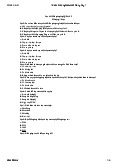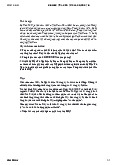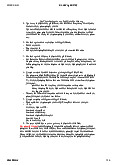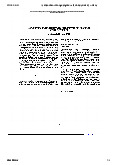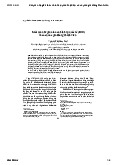





Preview text:
17:41 31/7/24
Note for the History of Britain
Note for the general History of Britain
1. The importance of the history of Britain
2. A quick guide through the course of Britain’s history 3. Glossary
1. The importance of the history of Britain
a. The importance of history to Britain internally
History is a vital part of Britain because it provides a foundation for understanding our
identity, culture, and political institutions. Thus, that is the reason why almost everyone in
britain is taught from a young age about British history: -
Its influences over our modern language: E.g: Shakespeare (1567-1616):
+ One of the foremost writers in the history of English literature.
+ Characteristics of his works consists of: an unwavering commitment to the examination of
people, the analysis of dominant societal topics of the Elizabethan era.
+ Whose literacy creations have persistently captivated audiences for hundreds of years
=> Ingraining themselves into British history with the creation of new vocabulary, social slangs and idioms.
=> The language used to describe some of the time periods can be confusing to international observers. -
Its influence over our general decision making, political policies and the way we view each other in England.
b. The importance of history of Britain externally
Britain’s history is intertwined with its global influence. The British Empire’s past trade and
diplomacy agreements are crucial when we examine our international relations and collaborations.
E.g: Indians might not see Britins in a favourable light while Hong Kong brings in mixed
views about the current state of the country.
“The affection they feel for the UK is nothing new: in 1997, when British rule was coming to
an end, pollsters asked people in Hong Kong their views on the empire. The result was
decisive: three quarters said Hong Kong would have been ‘worse off’ and only 5 per cent
said ‘better off’ without it. Another poll found that 65 percent of people in Hong Kong thought
that British rule is more good than bad; only 3 per cent thought that it was more bad than good.”
(George Lai, ‘Hong Kong and the surprising truth about the British Empire’, 18 May 2022, The Spectator)
2. A quick guide through the course of Britain’s history about:blank 1/6 17:41 31/7/24
Note for the History of Britain a. The Mediaeval Period
The Mediaeval period marks a time frame of 1000 years in the middle of the Western
Christian calendar, from about 400 AD to 1400 AD.
There are two types of imagery drawn upon when many people in Britain use the word ‘mediaeval’:
+ The positive connotation: It can represent a classical, fantasy and historical strong
England that was full of powerful masculine fingers.
E.g: It brings up brave heroic manly knights riding to war on horses, saving princesses under
the reign of powerful Kings and Queens.
+ The negative connotation: In this sense, it can often be used to call something old- fashioned and primitive.
E.g: People perceived the mediaeval as a place full of destitute people who were
uneducated, unhygienic and violent. It’s a time when rulers can commence an execution for
something as insignificant as stealing some food. -
The major historical events that changed the course of Britain history:
● The Norman Conquest (1066)
The main cause: King Edward died at the beginning of 1066, the lack of a clear heir led to a
disputed succession in which several contenders laid claim to the throne of England. Course of actions:
1. William of Poitiers states that William obtained Pope Alexander II's consent for the
invasion, signified by a papal banner, along with diplomatic support from other European rulers.
2. They landed at Pevensey in Sussex and erected a wooden castle at Hastings, from
which they raided the surrounding area.
3. The battle of Hastings was commenced.
In consequential to these events:
1. William the Conqueror became the King of England with the victory from the Norman Conquest of England.
2. The English monarchy was reshaped under the rule of William the Conqueror, who
introduced Norman culture and the feudal system, having a lasting influence on the
English language and legal system.
● Hundred Years’ War (1337-1453)
The main cause: The claim of England over the throne of France, which was then the
dominant kingdom in Western Europe.
General description: A prolonged conflict between England and France that lasted from 1337
to 1453 (the Late Middle Ages). The war was characterised by a series of conflicts and intermittent truces. about:blank 2/6 17:41 31/7/24
Note for the History of Britain
Ultimately, the war ended with the French regaining most of their territory, marking the
decline of English influence in France and contributing to the development of national
identities in both countries. The war's effect on European history was lasting. Both sides
produced innovations in military technology and tactics, including professional standing
armies and artillery, that permanently changed warfare in Europe. ● Civil War
The main causes: the disputes over the King’s authority, taxation, and religious differences
between the Anglican Church and various Protestant groups. The Parliamentarians The Royalists (Cavaliers) (Roundheads) Leader Oliver Cromwell Charles I Result
The execution of King Charles I in 1649 and the establishment of the
Commonwealth of England, led by Cromwell as Lord Protector. Civil War restoration
With the consent of Parliament, the monarchy was restored after a period of 11 years due to
many historical factors by the crowning of King Charles II (the son of King Charles I).
In consequential to this event and prior factors:
1. Charles, due to family relations, was made King of Scotland at the same time as King of England.
=> Scotland had the same monarch as England.
2. The Scottish and English parliament worked together.
3. In 1707, under the Acts of Union, the Scottish parliament joined the English
parliament in Westminster, uniting the two ancient enemies.
=> The creation of Great Britain. Additional note:
The survival of the royal family had a close tie with these events taking place due to Britain
never having a revolution like many other places in Europe.
It’s worth noting that internationally, after this, Europe had surging revolutions as the
people’s resentment toward their Kings and Queens grew. Many countries in the 1700 and
1800s lost their royal families (E.g: the French revolution).
In contrast, because of the civil war, the future monarchs in Britain became cautious of
challenging the Parliament and pushing their agenda too hard. This meant that Parliament
effectively had the power to choose who they wanted to be the figurehead of the country.
Thus, the royal family could still retain their power and wealth to this day. about:blank 3/6 17:41 31/7/24
Note for the History of Britain b. Victorian Period
The Victorian period is a period of British history named after the Queen who ruled for much
of this period—Queen Victoria. Her reign lasted from 1837 to 1901, however, the start of the
1800s was generally included when we talked about the Victorian period.
The Victorian period had a huge amount of significance on British Culture and the formation of modern day Britain.
This period of history could be considered as the height of Britain’s power regarding the
nation’s developments and influences, respectively internally and externally.
● The Industrial Revolution -
The Victorian era witnessed the height of what we call the Industrial Revolution.
It brought about rapid urbanisation, technological advancements, and changes in the labour forces and their habitations.
The booming appearances of factories and mass-produced goods altered the society
permanently. With the invention of steam engines, the rapid increase in technology
advancements brought simultaneously both developments and regression in many fields. It
had a huge effect on the British economy, gaining England and the factory owners a fortune for themselves.
‘With the earliest phases of industrialization over by about 1840, the British economy
expanded. Britain became the richest country in the world, but many people worked long
hours in harsh conditions. Yet, overall, standards of living were rising.’
However, this also brought along overpopulated cities and the strain of finding a job despite
the dangerous working environments. In contrast with the growing technology, in the social
department, Britain wasn’t doing that well. There were no laws to protect workers, so for the
most part, a large number of people were taken advantage of.
(Susie Steinbach on the Victorian era, Aug 27 2023, Britannica)*
Though with the rapid increase in technology advancements, the workers’ rights fell behind
for a long time. This meant that the Victorian period could be categorised as the worst and best period for Human rights.
‘-the 1840s were a bad time for workers and the poor—they were dubbed “the hungry forties”.’* - The rises of social movements
Life in England became so horrible and unbearable for much of the population that many
movements were created to push the government into creating reforms for workers’ rights.
E.g: Karl Marx, the father of Marxism and communism, lived in England during this period of
time. Witnessing such horrific treatments of workers, it pushed him to develop the ideas of
communism to aid the workers in the rise of social movements. about:blank 4/6 17:41 31/7/24
Note for the History of Britain
● The Victorian British Empire
The Victorian period is also a time of British Expansion and Invasion. While Queen Victoria
was in power, Britain acquired vast territories in Africa, Asia, and the Pacific.
During this time, Britain was known as the “empire on which the sun never sets”.
‘Dramatic expansion of the empire meant that such goods came to Britain from all over the
world. Between 1820 and 1870 the empire grew, shifted its orientation eastward, and
increased the number of nonwhite people over whom it exerted control.’*
Through our control, British Imperial ideology, English literature, and the English language
was dispersed over many regions of the world as you have observed. 3. Glossary
Medieval (adj): the Middle Ages (=the period in European history from about AD 600 to AD 1500)
Primitive (adj): human society at a very early stage of development, with people living in a
simple way without machines or a writing system
Destitute (adj): without money, food, a home, or possessions
Commence (v): to begin something
Execution (n): the legal punishment of killing someone
Contender (n): someone who competes with other people to try to win something
Feudal (adj): the social system of western Europe in the Middle Ages or any society that is
organised according to rank. In a feudal society, people at one level of society receive land
to live and work on from those higher than them in rank, and in return have to work for them
and fight for them if necessary, sometimes also giving them some of the food they produce
Prolonged (adj): continuing for a long time
Intermittent (adj): not happening regularly or continuously; stopping and starting repeatedly or with periods in between
Truces (n): a short interruption in a war or argument, or an agreement to stop fighting or arguing for a period of time
Warfare (n): the activity of fighting a war, often including the weapons and methods that are used Commonwealth
Consent (n): permission or agreement
Resentment (n): a feeling of anger because you have been forced to accept something that you do not like
Figurehead (n): a person who is in a high position in a country or an organisation but who has no real power or authority about:blank 5/6 17:41 31/7/24
Note for the History of Britain
The Industrial revolution: a period of global transition of human economy towards more
efficient and stable manufacturing processes that succeeded the Agricultural Revolution,
starting from Great Britain, continental Europe, and the United States, that occurred during
the period from around 1760 to about 1820–1840
Dub (v): dub somebody + noun to give somebody/something a particular name, often in a humorous or critical way
Disperse (v): to move apart and go away in different directions; to make somebody/something do this about:blank 6/6
